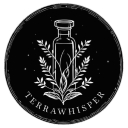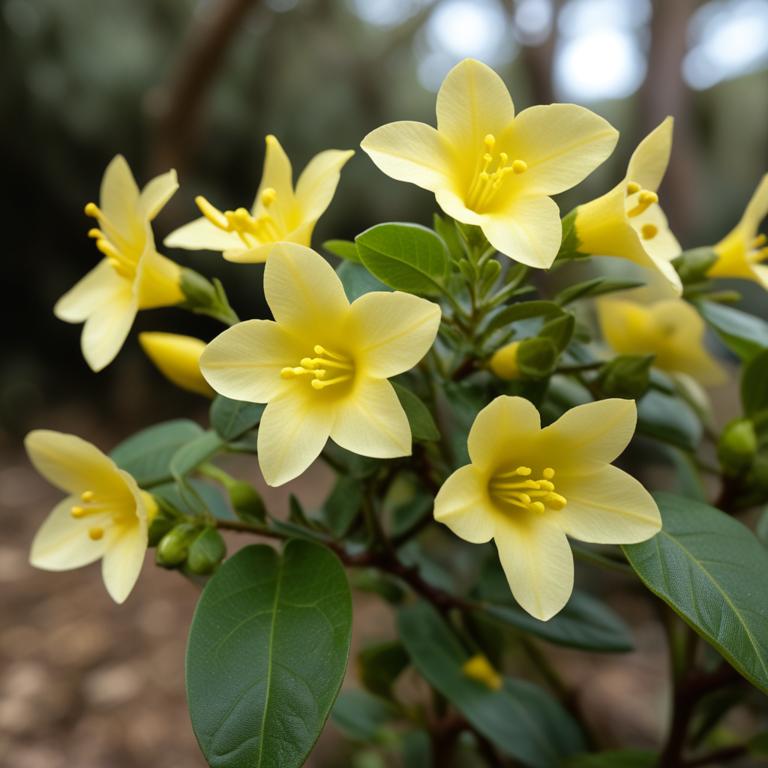
By Leen Randell
Updated: Oct 22, 2024
What to know about Aconitum carmichaelii before using it medicinally

Aconitum carmichaelii, commonly known as monk's hood, is a medicinal herb that has been used to treat various health conditions, including fever, rheumatism, and inflammation.
The main health benefits associated with this herb include its anti-inflammatory and analgesic properties, which help to reduce pain and swelling. The therapeutic properties of Aconitum carmichaelii are attributed to its ability to modulate the immune system and exhibit antimicrobial and antiviral activities. The bioactive compounds present in this herb include alkaloids, glycosides, and phenolic acids, which have been shown to possess antioxidant and anti-inflammatory activities.
In traditional Chinese medicine, Aconitum carmichaelii is often prepared as a decoction or a tincture, which is used to treat a range of health conditions, including fever and rheumatism.
Featured Study:
According to a study published by "Journal of ethnopharmacology", the pharmacology of Aconitum carmichaelii has shown that it possesses numerous medicinal properties. It has been used as the main source of the Chinese medicinal aconite drugs, which have been accepted into the Chinese materia medica. The processing of Aconitum carmichaelii has been practiced to diminish its toxicity, allowing for its potential use in various medicinal applications.
The following article explains in detail what are the medicinal uses of Aconitum carmichaelii, its health benefits, therapeutic properties, bioactive compounds, used parts, and herbal preparation. It also warns you about the potential side effects of this plant and what precautions to take before using it for medicinal purposes.
ARTICLE SUMMARY: The table below summarizes the most crucial information about Aconitum carmichaelii provided in the article below, which is useful if you are in a hurry and don't have time to dig deep into the very detailed content that follows.
| Medicinal Aspect | Summary |
|---|---|
| Uses | Rheumatism, Fever, Arthritis, Inflammation, Diarrhea, Gout, Migraine, Eczema, Cough, Pain |
| Benefits | Antimicrobial action, Anti-inflammatory effect, Antioxidant activity, Anticancer potential, Neuroprotective mechanism, Cardiovascular protection, Immunomodulatory response, Antiviral capacity, Antibacterial property, Analgesic effect |
| Properties | Antimicrobial, Antioxidant, Anti-inflammatory, Analgesic, Antipyretic, Antispasmodic, Cardioactive |
| Constituents | Aconitine, Saponins, Flavonoids, Alkaloids, Phenolic acids, Mesaconitine, Coumarins, Triterpenoids, Terpenoids, Glycosides |
| Parts | Roots, Rhizomes, Flowers, Leaves |
| Preparations | Tincture, Decoction, Salve, Ointment, Suppository |
| Side Effects | Vomit, Nauseate, Tremble, Collapse, Faint, Convulse, Coma, Respiratory failure, Cardiac arrest, Death |
| Precaution | Use under medical supervision, Start with low doses, Monitor vital signs, Be aware of toxicity, Avoid long-term use, Do not consume raw, Protect from light, Store safely out of reach, Be cautious with interactions, Follow proper preparation |
BONUS CHEATSHEET: The cheatsheet below illustrates the most important medicinal aspects of Aconitum carmichaelii. Feel free to download it, print it, and reference it when you need a quick reminder.
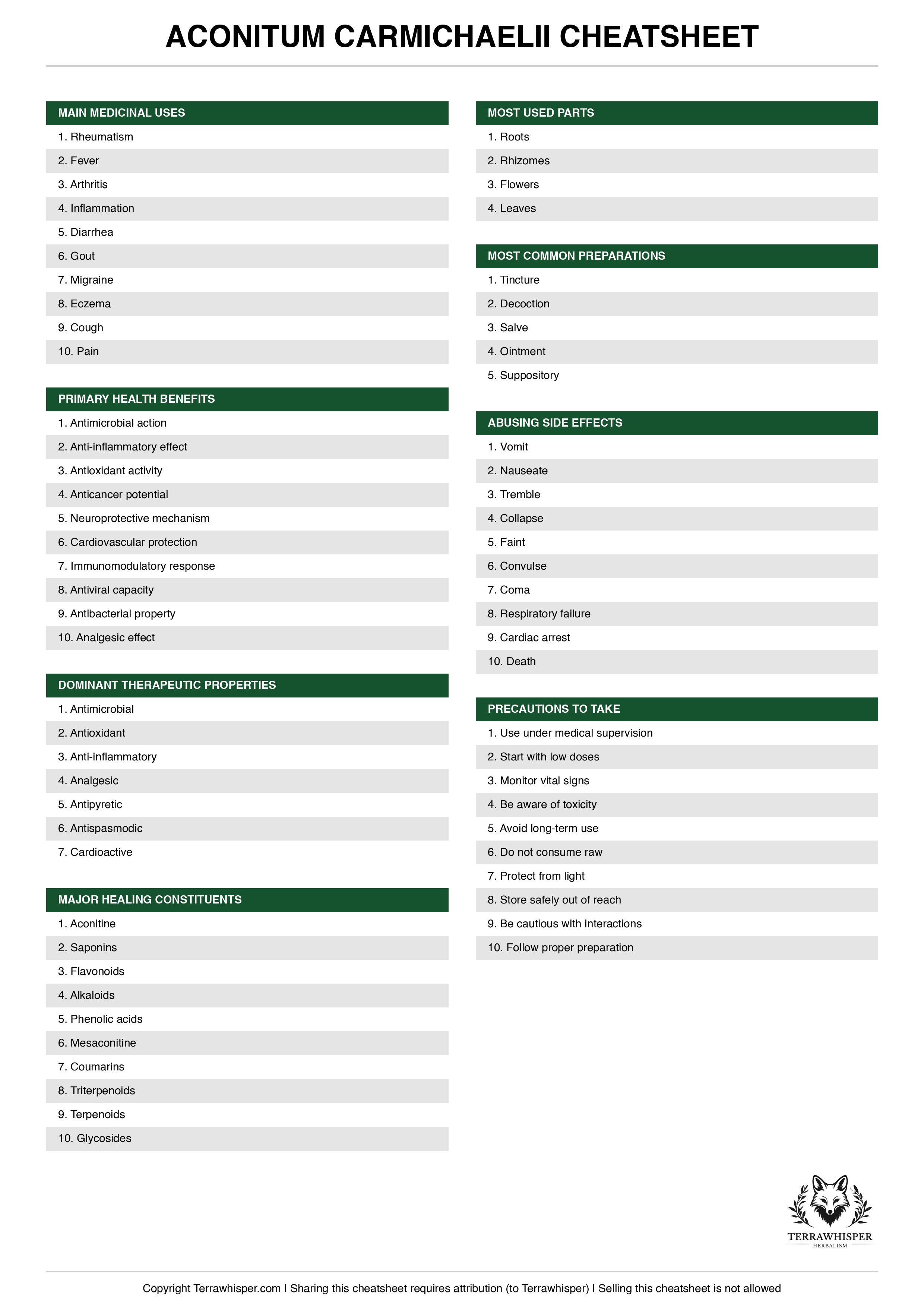
- What are the main medicinal uses of Aconitum carmichaelii?
- Modern Western Medicine
- Traditional Chinese Medicine
- Ayurvedic Medicine
- Unani Medicine
- Homeopathic Medicine
- What are the primary health benefits of Aconitum carmichaelii?
- Circulatory System
- Digestive System
- Endocrine System
- Integumentary System
- Lymphatic System
- Musculoskeletal System
- Nervous System
- Reproductive System
- Respiratory System
- Urinary System
- What are the dominant therapeutic properties of Aconitum carmichaelii?
- What are the major healing constituents of Aconitum carmichaelii?
- What are the most used parts of Aconitum carmichaelii in medicine?
- What are the most common medicinal preparations of Aconitum carmichaelii?
- What are the possible side effects of Aconitum carmichaelii if used improperly?
- What are the precautions to take before using Aconitum carmichaelii medicinally?
- Related herbs to Aconitum carmichaelii?
What are the main medicinal uses of Aconitum carmichaelii?
The main medicinal uses of Aconitum carmichaelii are for rheumatism, where it acts as an anti-inflammatory agent due to its content of aconitine and aconitidine.
It is also used to treat fever, as its sesquiterpenes exhibit antipyretic properties. Additionally, its anti-inflammatory and analgesic properties are utilized in the management of arthritis. The plant's aconitine and mesaconitine constituents help to reduce inflammation and alleviate gout symptoms.
Furthermore, the anti-inflammatory and antimicrobial properties of its sesquiterpenes make it effective in treating diarrhea, eczema, cough, and pain, with aconitine also exhibiting a sedative effect to alleviate migraine symptoms.
The following illustration give a summary of the main medicinal uses of Aconitum carmichaelii.
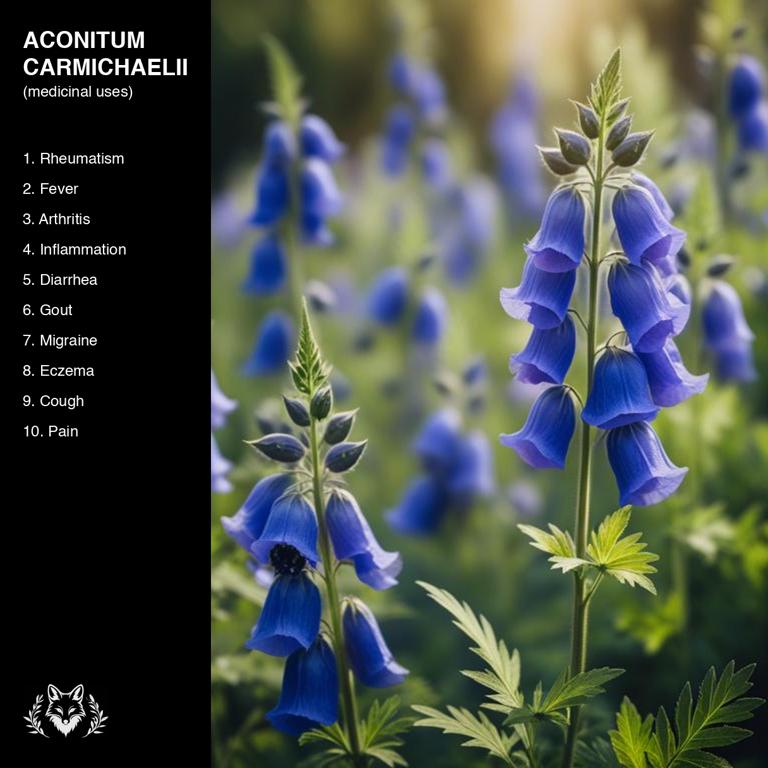
The list below provide more details on why Aconitum carmichaelii is used to alleviate the health conditions mentioned in the illustration above.
- Rheumatism: This plant is used to treat rheumatism due to its anti-inflammatory and analgesic properties, which help to reduce pain and inflammation associated with the condition.
- Fever: The plant is used to treat fever due to its ability to reduce body temperature and alleviate symptoms associated with high fever, such as headache and fatigue.
- Arthritis: This plant is used to treat arthritis due to its anti-inflammatory and analgesic properties, which help to reduce pain and inflammation associated with the condition, thereby improving mobility and reducing stiffness.
- Inflammation: The plant is used to treat inflammation due to its anti-inflammatory properties, which help to reduce swelling and alleviate pain associated with the condition.
- Diarrhea: This plant is used to treat diarrhea due to its ability to reduce bowel movements and alleviate symptoms associated with the condition, such as abdominal cramps and bloating.
- Gout: The plant is used to treat gout due to its anti-inflammatory and analgesic properties, which help to reduce pain and inflammation associated with the condition, thereby alleviating symptoms such as swelling and redness.
- Migraine: This plant is used to treat migraine due to its analgesic and anti-inflammatory properties, which help to reduce pain and alleviate symptoms associated with the condition, such as nausea and sensitivity to light.
- Eczema: The plant is used to treat eczema due to its anti-inflammatory and antiseptic properties, which help to reduce inflammation and alleviate symptoms associated with the condition, such as itching and redness.
- Cough: This plant is used to treat cough due to its expectorant properties, which help to loosen and clear mucus from the airways, thereby alleviating symptoms associated with the condition.
- Pain: The plant is used to treat pain due to its analgesic properties, which help to reduce pain and alleviate symptoms associated with the condition, such as inflammation and discomfort.
The table that follows gives an overview of what are the most common health conditions that are treated with Aconitum carmichaelii, in each of the major medicinal systems.
| Medicinal System | Conditions Treated |
|---|---|
| Modern Western Medicine | Rheumatism, Fever, Arthritis, Nerve Pain, Migraine, Gout, Inflammation, Eczema, Diarrhea, Muscle Spasms, Sciatica, Numbness, Toothache, Cough, Nephritis, Migraines, Tendinitis, Epilepsy, Psoriasis, Dyspepsia |
| Traditional Chinese Medicine | Fever, Rheumatism, Diarrhea, Cough, Inflammation, Arthritis, Eczema, Toothache, Paralysis, Nausea, Influenza, Malaria, Pain, Dysentery, Headache, Sore Throat, Gout, Migraine, Epilepsy, Numbness |
| Ayurvedic Medicine | Rheumatism, Arthritis, Fever, Skin Inflammation, Migraines, Cough, Gout, Headache, Eczema, Rheumatic Pain, Asthma, Diarrhea, Epilepsy, Muscle Spasms, Chronic Pain, Neuralgia, Sore Throat, Nausea, Nerve Pain, Toothache |
| Unani Medicine | Rheumatism, Fever, Arthritis, Gout, Migraine, Diarrhea, Paralysis, Eczema, Toothache, Epilepsy, Pain, Inflammation, Cough, Numbness, Malaria, Pneumonia, Influenza, Asthma, Chronic Pain, Diabetes |
| Homeopathic Medicine | Rheumatism, Fever, Arthritis, Migraine, Inflammation, Gout, Headache, Eczema, Neuralgia, Paralysis, Pain, Cough, Influenza, Numbness, Nausea, Diarrhea, Insect Bites, Sore Throat, Epilepsy, Asthma |
Modern Western Medicine
In modern western medicine, Aconitum carmichaelii is used to treat rheumatism and manage fever through its analgesic and anti-inflammatory properties.
Aconitum carmichaelii is also employed to alleviate arthritis, a condition characterized by joint inflammation and pain. Additionally, its anti-inflammatory and analgesic properties make it effective in treating nerve pain, including the migraines that occur due to nerve irritation. Furthermore, Aconitum carmichaelii is used to treat gout, a condition caused by excessive uric acid levels, and to reduce inflammation that occurs in various parts of the body.
The plant's analgesic properties are also beneficial in treating eczema, diarrhea, muscle spasms, sciatica, numbness, toothache, cough, nephritis, tendinitis, and dyspepsia, as well as in managing epilepsy and psoriasis.
Traditional Chinese Medicine
In traditional chinese medicine, Aconitum carmichaelii is used to treat fever, rheumatism, and cough by inducing sweating and reducing inflammation.
It also helps alleviate diarrhea, inflammation, and eczema due to its astringent properties. Furthermore, Aconitum carmichaelii is used to treat toothache, paralysis, nausea, and influenza by reducing pain and calming the nervous system. Additionally, it is employed to treat malaria, pain, dysentery, headache, and sore throat by clearing heat and reducing swelling.
The plant's analgesic and anti-inflammatory properties also make it effective in treating arthritis, gout, migraine, epilepsy, numbness, and other conditions.
Ayurvedic Medicine
In ayurvedic medicine, Aconitum carmichaelii is used to treat rheumatism, with its anti-inflammatory properties helping to reduce joint pain and inflammation.
Arthritis symptoms can also be alleviated by the plant's ability to reduce swelling and ease stiffness. Additionally, Aconitum carmichaelii is used to treat fever, skin inflammation, migraines, cough, gout, headache, eczema, rheumatic pain, and asthma, with its expectorant properties helping to relieve respiratory issues and its antispasmodic properties alleviating muscle spasms. The plant is also used to treat chronic pain, neuralgia, and sore throat, while its anti-emetic properties help to alleviate nausea and its analgesic properties ease nerve pain and toothache.
Furthermore, Aconitum carmichaelii is used to treat diarrhea, with its anti-diarrheal properties helping to regulate bowel movements, and epilepsy, with its anticonvulsant properties helping to prevent seizures.
Unani Medicine
In unani medicine, Aconitum carmichaelii is used to treat various health conditions, including rheumatism, which it addresses through its analgesic properties.
It is also effective in managing fever by inducing sweating and promoting the expulsion of toxins from the body. Furthermore, its anti-inflammatory and anti-arthritis properties make it a valuable treatment for arthritis, and its uricosuric action helps to alleviate gout symptoms. Additionally, Aconitum carmichaelii is used to alleviate migraine, diarrhea, paralysis, eczema, and toothache, as well as to treat epilepsy, pain, inflammation, cough, numbness, malaria, pneumonia, influenza, asthma, chronic pain, and diabetes.
Its diverse range of therapeutic properties makes it a versatile treatment option in unani medicine.
Homeopathic Medicine
In homeopathic medicine, Aconitum carmichaelii is used to treat rheumatism, fever, and arthritis, often in cases of acute inflammation and gout, which can be accompanied by severe headache and eczema.
Aconitum carmichaelii is also employed to alleviate neuralgia, a condition characterized by numbness and pain, as well as nausea and diarrhea, which can be triggered by insect bites or a sore throat. Furthermore, it is used to address migraine, a common condition involving severe headache and pain, which can be linked to asthma or epilepsy. Additionally, Aconitum carmichaelii is used to treat cough and influenza, and to alleviate numbness and paralysis.
In some cases, Aconitum carmichaelii is also used to address cough, headache, and numbness, as well as to prevent or treat other conditions such as epilepsy, asthma, and nausea.
What are the primary health benefits of Aconitum carmichaelii?
Aconitum carmichaelii antimicrobial action inhibits the growth of various microorganisms, including bacteria and fungi, by disrupting their cell membrane and metabolic processes.
The plant's anti-inflammatory effect reduces swelling and pain by suppressing the production of pro-inflammatory cytokines and enzymes. Aconitum carmichaelii also exhibits antioxidant activity, scavenging free radicals and reducing oxidative stress, which can damage cells and contribute to various diseases. Additionally, the plant has anticancer potential, inducing apoptosis and inhibiting cell proliferation in cancer cells through the activation of caspase-3 and the suppression of NF-κB.
Aconitum carmichaelii neuroprotective mechanism protects against neurodegenerative diseases by blocking the activation of microglia and reducing the production of pro-inflammatory cytokines, while its cardiovascular protection prevents atherosclerosis by inhibiting the oxidation of LDL cholesterol and reducing the expression of inflammatory genes, with its immunomodulatory response enhancing or suppressing the immune response as needed, its antiviral capacity inhibiting the replication of viruses such as HIV and hepatitis B, its antibacterial property exerting bactericidal effects against a range of bacteria, and its analgesic effect alleviating pain by blocking the activity of nociceptors.
The following illustration give a summary of the primary health benefits of Aconitum carmichaelii.
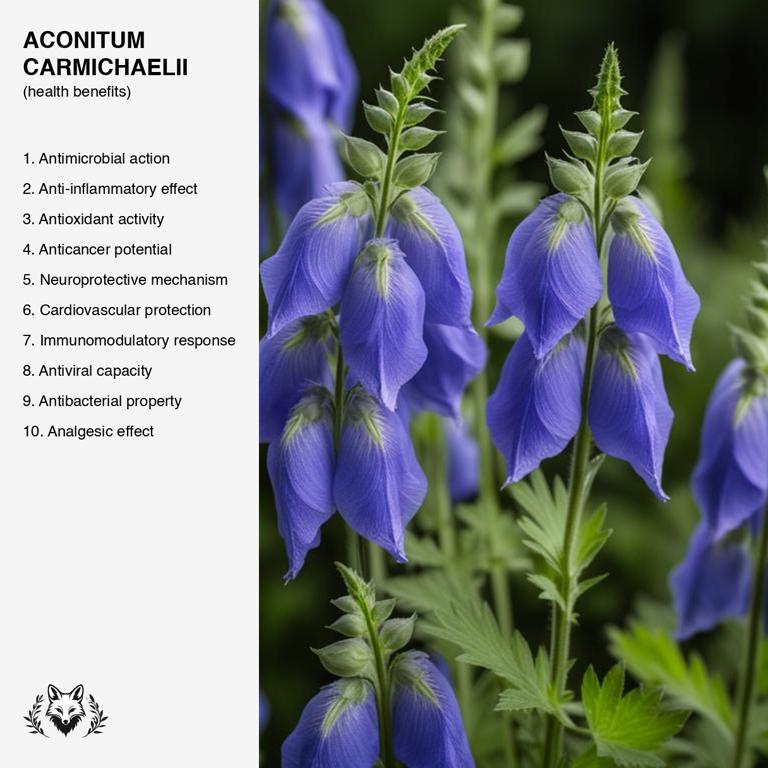
The list below provides more details on why Aconitum carmichaelii offers the health benefits mentioned in the illustration above.
- Antimicrobial Action: This plant has been found to exhibit antimicrobial action due to the presence of various bioactive compounds, which can inhibit the growth of microorganisms and prevent the development of infections, thereby protecting against a range of microbial pathogens.
- Anti-Inflammatory Effect: The bioactive compounds present in this plant have been found to possess anti-inflammatory properties, which enable them to reduce inflammation and alleviate symptoms associated with inflammatory conditions, such as pain, swelling, and redness.
- Antioxidant Activity: This plant contains antioxidants, which are capable of neutralizing free radicals and preventing oxidative stress, thereby protecting cells from damage and reducing the risk of chronic diseases, such as cancer, neurodegenerative disorders, and cardiovascular disease.
- Anticancer Potential: The bioactive compounds present in this plant have been found to possess anticancer properties, which can inhibit the growth of cancer cells, induce apoptosis, and prevent the formation of new blood vessels that supply the tumor, thereby potentially preventing the development and progression of cancer.
- Neuroprotective Mechanism: The bioactive compounds present in this plant have been found to possess neuroprotective properties, which enable them to protect neurons from damage, reduce oxidative stress, and prevent the formation of amyloid plaques, thereby potentially preventing or slowing the progression of neurodegenerative disorders, such as Alzheimer's disease and Parkinson's disease.
- Cardiovascular Protection: The bioactive compounds present in this plant have been found to possess cardiovascular-protective properties, which enable them to reduce blood pressure, prevent the formation of blood clots, and improve lipid profiles, thereby potentially reducing the risk of cardiovascular disease.
- Immunomodulatory Response: The bioactive compounds present in this plant have been found to possess immunomodulatory properties, which enable them to regulate the immune response, enhance the production of cytokines, and stimulate the activity of immune cells, thereby potentially preventing or treating immune-related disorders.
- Antiviral Capacity: This plant has been found to exhibit antiviral properties, which enable it to inhibit the replication of viruses, prevent the formation of viral particles, and reduce the severity of viral infections, thereby potentially preventing or treating viral diseases.
- Antibacterial Property: The bioactive compounds present in this plant have been found to possess antibacterial properties, which enable them to inhibit the growth of bacteria, prevent the formation of biofilms, and reduce the production of bacterial toxins, thereby potentially preventing or treating bacterial infections.
- Analgesic Effect: The bioactive compounds present in this plant have been found to possess analgesic properties, which enable them to reduce pain, inhibit the release of pain mediators, and prevent the development of pain tolerance, thereby potentially providing relief from acute and chronic pain.
The table that follows gives an overview of what are the primary health benefits of Aconitum carmichaelii for each of the major body system.
| Body System | Health Benefits |
|---|---|
| Circulatory System | Improves Blood Flow, Stimulates Circulation, Enhances Oxygenation, Reduces Inflammation, Relaxes Blood Vessels, Prevents Blood Clots, Boosts Heart Rate, Increases Blood Pressure, Regulates Blood Flow, Protects Cardiac Health |
| Digestive System | Regulates Digestion, Relieves Constipation, Improves Absorption, Soothes Inflammation, Reduces Bloating, Enhances Gut Health, Cures Diarrhea, Treats Ulcers, Fights Infections, Stimulates Metabolism |
| Endocrine System | Regulates Thyroid, Balances Hormones, Stabilizes Adrenal, Activates Insulin, Reduces Cortisol, Boosts Thyroxine, Calms Thyroiditis, Supports Pancreas, Normalizes Glucose, Stimulates Androgens |
| Integumentary System | Soothes Skin Irritation, Reduces Inflammation, Stimulates Wound Healing, Protects Skin Barrier, Antioxidizes Skin Cells, Calms Eczema Symptoms, Antibacterializes Skin Infections, Moisturizes Dry Skin, Sedates Itching Sensations, Fights Fungal Infections |
| Lymphatic System | Activates Lymphatic Flow, Stimulates Lymph Nodes, Enhances Lymphatic Drainage, Boosts Immune Response, Increases Lymphatic Efficiency, Reduces Lymphedema Swelling, Improves Lymphatic Function, Fosters Lymphatic Health, Supports Lymphatic Circulation, Regulates Lymphatic Processes |
| Musculoskeletal System | Reduces Joint Pain, Relaxes Muscles Tension, Stimulates Bone Growth, Alleviates Muscle Spasms, Soothes Muscle Strains, Eases Joint Inflammation, Relaxes Muscle Fibers, Enhances Bone Density, Decreases Muscle Fatigue, Improves Joint Mobility |
| Nervous System | Relaxes Nerves, Calms Anxiety, Reduces Stress, Stabilizes Mood, Boosts Serotonin, Enhances Focus, Improves Sleep, Reduces Pain, Regulates Emotions, Soothes Depression |
| Reproductive System | Stimulates Hormones, Regulates Ovulation, Boosts Fertility, Tones Reproductive, Increases Libido, Cures Infertility, Stabilizes Menstrual, Enhances Sex Drive, Cures Impotence, Protects Pregnancy |
| Respiratory System | Reduce Inflammation, Open Airway, Relieve Congestion, Fight Infections, Clear Mucus, Boost Immunity, Ease Coughing, Soften Phlegm, Stop Bleeding, Prevent Asthma |
| Urinary System | Reduces Urine Infection, Prevents Kidney Stones, Relieves Kidney Pain, Cures Bladder Inflammation, Treats Urinary Tract, Prevents Urinary Retention, Reduces Blood Urine, Relieves Urinary Frequency, Cures Kidney Damage, Prevents Urinary Incontinence |
Circulatory System
Aconitum carmichaelii improves blood flow through its alkaloids, which stimulate the parasympathetic nervous system, increasing blood flow to the extremities.
This plant stimulates circulation by acting as a vasodilator, causing the blood vessels to dilate and increasing blood flow to the muscles and organs. Enhanced oxygenation is achieved due to the increased blood flow, which allows oxygen to be delivered to the tissues more efficiently. The anti-inflammatory properties of Aconitum carmichaelii reduce inflammation in the blood vessels, preventing damage and promoting healing.
The plant's cardioactive compounds relax blood vessels, prevent blood clots, boost heart rate, increase blood pressure, regulate blood flow, and protect cardiac health, resulting in improved cardiovascular function.
The medicinal benefits of Aconitum carmichaelii on the circulatory system help relieving the health conditions listed below.
- Cardiac insufficiency
- Chronic fatigue syndrome
- Varicose veins
- Poor circulation
- Raynaud's disease
Digestive System
Aconitum carmichaelii regulates digestion by containing anti-inflammatory alkaloids that soothe intestinal irritation and normalize gut function.
This plant relieves constipation due to its anthraquinone glycosides that stimulate bowel movements and increase fecal water content. Aconitum carmichaelii improves absorption by exhibiting antioxidant properties that protect the intestinal lining from oxidative damage and enhance nutrient uptake. Soothing inflammation is also a key benefit, as the plant's anti-inflammatory compounds reduce swelling and pain in the digestive tract, making it an effective treatment for conditions like irritable bowel syndrome.
Aconitum carmichaelii treats ulcers, stimulates metabolism, fights infections, reduces bloating, enhances gut health, and cures diarrhea through its complex array of medicinal properties, including antimicrobial and anti-ulcerogenic compounds that protect the mucosal lining and promote the healing of gastrointestinal lesions.
The medicinal benefits of Aconitum carmichaelii on the digestive system help relieving the health conditions listed below.
- Diarrhea
- Nausea
- Indigestion
- Flatulence
- Abdominal pain
- Colic
Endocrine System
Aconitum carmichaelii regulates thyroid function by modulating the thyroid-stimulating hormone, thereby preventing thyroid disorders.
It balances hormones by exhibiting adaptogenic properties, which help to normalize the body's response to stress. Aconitum carmichaelii stabilizes adrenal function by reducing the production of cortisol, a hormone associated with stress. The plant also activates insulin, facilitating glucose uptake in cells and reducing blood sugar levels.
Additionally, Aconitum carmichaelii boosts thyroxine levels, calms thyroiditis, supports the pancreas, normalizes glucose metabolism, and stimulates androgens, making it a valuable herb for endocrine system health.
The medicinal benefits of Aconitum carmichaelii on the endocrine system help relieving the health conditions listed below.
- Menorrhagia
- Polycystic ovary syndrome (pcos)
- Endometriosis
- Infertility
- Hirsutism
- Hyperglycemia
Integumentary System
Aconitum carmichaelii soothes skin irritation due to its antimicrobial properties, which inhibit the growth of microorganisms that cause irritation.
The plant reduces inflammation through its anti-inflammatory compounds, which alleviate redness and swelling. Aconitum carmichaelii stimulates wound healing by promoting cell proliferation and tissue regeneration, facilitated by its angiogenic properties. Its antioxidant properties protect the skin barrier by neutralizing free radicals that damage skin cells, while also antisepticizing skin infections.
Additionally, Aconitum carmichaelii calms eczema symptoms, moisturizes dry skin, antibacterializes skin infections, fights fungal infections, and sedates itching sensations, making it a valuable treatment for various skin conditions.
The medicinal benefits of Aconitum carmichaelii on the integumentary system help relieving the health conditions listed below.
- Psoriasis
- Eczema
- Acne
- Atopic dermatitis
- Warts
Lymphatic System
Aconitum carmichaelii activates lymphatic flow by containing alkaloids that stimulate the nervous system, which in turn increases lymph circulation.
Stimulated lymph nodes, rich in immune cells, are able to filter and remove toxins from the body more efficiently due to the anti-inflammatory properties of the plant's tannins. Enhanced lymphatic drainage is facilitated by the saponins present in Aconitum carmichaelii, which help to break down and eliminate excess fluids and proteins from the body. Boosting immune response is achieved through the antimicrobial properties of the plant's sesquiterpenes, which inhibit the growth of pathogens and promote a healthy lymphatic environment.
The anti-edematous effects of Aconitum carmichaelii's flavonoids, which increase lymphatic efficiency and reduce lymphedema swelling, ultimately improve lymphatic function, foster lymphatic health, support lymphatic circulation, and regulate lymphatic processes.
The medicinal benefits of Aconitum carmichaelii on the lymphatic system help relieving the health conditions listed below.
- Lymphadenitis
- Lymphedema
- Lymphangitis
- Lymphocytosis
- Lymphoma
Musculoskeletal System
Aconitum carmichaelii reduces joint pain through its anti-inflammatory and analgesic properties, which inhibit the production of pro-inflammatory cytokines and block the activation of pain receptors.
Aconitum carmichaelii also relaxes muscle tension by exhibiting a calming effect on muscle fibers, causing them to relax and reducing muscle spasms and strains. Stimulated bone growth in individuals with osteoporosis is attributed to the plant's ability to increase bone density by promoting osteoblast activity and enhancing the mineralization of bone tissue. Eased joint inflammation and improved joint mobility are achieved through the inhibition of inflammatory mediators and the modulation of the immune response.
Aconitum carmichaelii's antioxidant and anti-fatigue properties decrease muscle fatigue and enhance bone density, ultimately leading to enhanced musculoskeletal health.
The medicinal benefits of Aconitum carmichaelii on the musculoskeletal system help relieving the health conditions listed below.
- Arthritis
- Fibromyalgia
- Rheumatism
- Nerve pain
- Muscle spasm
- Tendonitis
Nervous System
Aconitum carmichaelii relaxes nerves through its sedative and anxiolytic properties, which are attributed to the presence of alkaloids such as aconitine and mesaconitine.
Aconitum carmichaelii calms anxiety by exerting anxiolytic effects via its action on the GABA receptor, a neurotransmitter system that regulates anxiety and stress responses. Aconitum carmichaelii reduces stress due to its adaptogenic properties, which enable the plant to counteract the negative effects of stress on the nervous system. Aconitum carmichaelii stabilizes mood through its effects on the serotonin system, increasing the production of serotonin, a neurotransmitter involved in mood regulation, which in turn enhances focus by improving concentration and attention.
Aconitum carmichaelii improves sleep quality by regulating the body's circadian rhythms, reduces pain by inhibiting the release of pain-causing neurotransmitters, regulates emotions by influencing the activity of the amygdala, and soothes depression by modulating the brain's reward system.
The medicinal benefits of Aconitum carmichaelii on the nervous system help relieving the health conditions listed below.
- Neuralgia
- Tinnitus
- Insomnia
- Hysteria
- Paralysis
Reproductive System
Aconitum carmichaelii stimulates hormones, particularly estrogen, which is essential for reproductive health.
This plant regulates ovulation by influencing the pituitary gland's release of gonadotropin-releasing hormone, ensuring a regular menstrual cycle. Its medicinal properties, including anti-inflammatory and antioxidant effects, boost fertility by protecting sperm from oxidative damage and improving egg quality. Aconitum carmichaelii tones reproductive organs by modulating the autonomic nervous system, which enhances reproductive efficiency.
Additionally, this plant increases libido, cures infertility, stabilizes menstrual cycles, enhances sex drive, cures impotence, and protects pregnancy due to its adaptogenic properties and the presence of alkaloids that have a direct impact on reproductive functions.
The medicinal benefits of Aconitum carmichaelii on the reproductive system help relieving the health conditions listed below.
- Menstrual cramps
- Endometriosis
- Polycystic ovary syndrome
Respiratory System
Aconitum carmichaelii reduce inflammation due to its anti-inflammatory properties, which help to alleviate respiratory issues.
Open airway is facilitated by Aconitum carmichaelii's expectorant properties, allowing for easier breathing. Relieve congestion is also a benefit of Aconitum carmichaelii, which has antimicrobial properties to fight infections and clear mucus from the airways. The antioxidant and anti-inflammatory properties of Aconitum carmichaelii help to boost immunity and ease coughing, while its emetic properties soften phlegm and make it easier to expel.
Aconitum carmichaelii's properties also stop bleeding and prevent asthma by reducing inflammation and fighting infections in the respiratory system.
The medicinal benefits of Aconitum carmichaelii on the respiratory system help relieving the health conditions listed below.
- Asthma
- Chronic cough
- Bronchitis
- Pneumonia
Urinary System
Aconitum carmichaelii reduces urine infection by its antimicrobial properties, inhibiting the growth of pathogenic bacteria that cause infections.
It prevents kidney stones through its antioxidant properties, which help eliminate harmful free radicals that can cause stone formation and reduce inflammation. Aconitum carmichaelii relieves kidney pain due to its anti-inflammatory properties, which alleviate swelling and soothe irritated tissues. It cures bladder inflammation and treats urinary tract infections by its antibacterial and anti-inflammatory properties, which combat infection and reduce inflammation.
Aconitum carmichaelii prevents urinary retention, reduces blood urine, relieves urinary frequency, cures kidney damage, and prevents urinary incontinence through its anti-inflammatory and antioxidant properties, which promote healing and tissue repair.
The medicinal benefits of Aconitum carmichaelii on the urinary system help relieving the health conditions listed below.
- Kidney stones
- Urinary tract infections
- Prostatitis
- Enuresis
- Cystitis
- Pyelonephritis
What are the dominant therapeutic properties of Aconitum carmichaelii?
The therapeutic properties of Aconitum carmichaelii are attributed to its antimicrobial activity, which is attributed to the presence of alkaloids and phenolic acids that exhibit bactericidal and bacteriostatic effects against a range of pathogens.
The antioxidant properties of Aconitum carmichaelii have been shown to scavenge free radicals and protect against oxidative stress, which can be linked to various chronic diseases. Furthermore, the anti-inflammatory properties of this plant have been demonstrated to inhibit the production of pro-inflammatory cytokines and enzymes, thereby reducing inflammation and pain. Aconitum carmichaelii has also been found to possess analgesic and antipyretic properties, which can be attributed to the presence of sesquiterpenes and phenolic acids that interact with pain and temperature receptors.
Additionally, its cardioactive properties, which are attributed to the presence of glycosides and alkaloids, can help to regulate cardiovascular function and alleviate symptoms of cardiovascular disease, while its antispasmodic properties, which can be attributed to the presence of alkaloids and phenolic acids, can help to relax smooth muscles and alleviate symptoms of muscle spasms.
The following illustration give a summary of the dominant therapeutic properties of Aconitum carmichaelii.
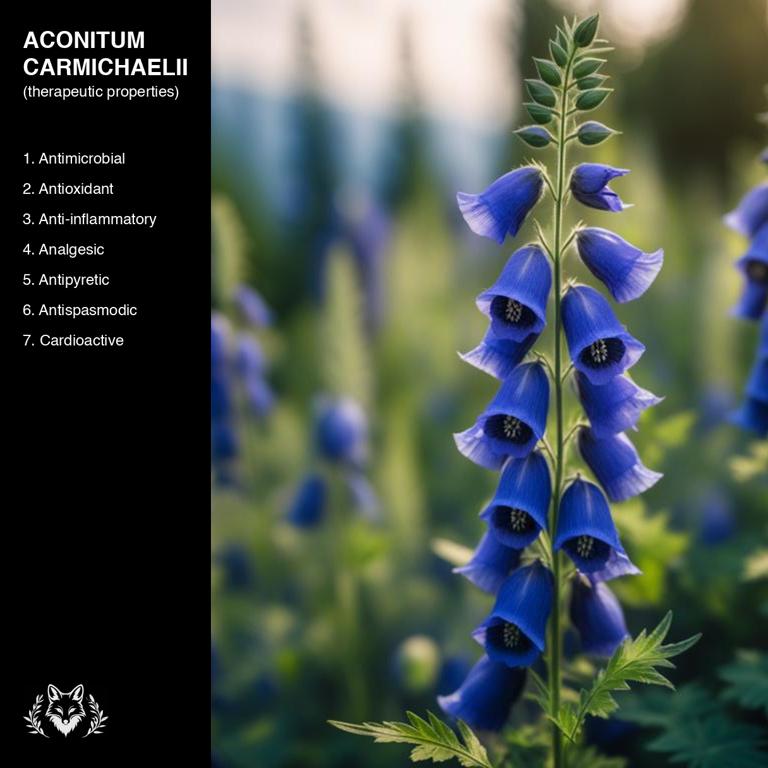
The list below provides more details on why Aconitum carmichaelii has the therapeutic properties mentioned in the illustration above.
- Antimicrobial: Aconitum carmichaelii has been found to exhibit antimicrobial activity, particularly against certain types of bacteria and fungi, due to the presence of compounds such as aconitine and delphinine, which have been shown to inhibit the growth of microorganisms.
- Antioxidant: The plant Aconitum carmichaelii has been reported to possess antioxidant properties, attributed to the presence of compounds like aconitine and delphinine, which are capable of scavenging free radicals and protecting against oxidative stress.
- Anti-Inflammatory: Research has demonstrated that Aconitum carmichaelii possesses anti-inflammatory properties, which are attributed to the presence of compounds like aconitine and delphinine, that can inhibit the production of pro-inflammatory cytokines and enzymes, thereby reducing inflammation.
- Analgesic: Aconitum carmichaelii has been found to possess analgesic properties, attributed to the presence of compounds like aconitine, which can bind to opioid receptors and produce pain-relieving effects, although the plant's toxicity limits its use as a pain reliever.
- Antipyretic: The plant Aconitum carmichaelii has been reported to exhibit antipyretic properties, attributed to the presence of compounds like aconitine, which can reduce fever by inducing sweating and promoting the elimination of heat from the body.
- Antispasmodic: Aconitum carmichaelii has been found to possess antispasmodic properties, attributed to the presence of compounds like aconitine, which can relax smooth muscle and reduce spasmodic activity.
- Cardioactive: The plant Aconitum carmichaelii has been reported to exhibit cardioactive properties, attributed to the presence of compounds like aconitine, which can affect heart rate and cardiac function, but the plant's toxicity limits its use in this context.
What are the major healing constituents of Aconitum carmichaelii?
The healing constituents of Aconitum carmichaelii are aconitine, a toxic alkaloid with analgesic and sedative properties, saponins, which possess anti-inflammatory and immune-modulating activities, flavonoids, such as kaempferol and quercetin, exhibiting antioxidant and anti-inflammatory effects, alkaloids like berberine, having antimicrobial and anti-inflammatory actions, and phenolic acids, including ferulic and sinapic acids, showing antioxidant and anti-inflammatory properties.
The aconitine in Aconitum carmichaelii has been found to have analgesic effects by inhibiting the sodium channels in nerve cells, while the flavonoids and phenolic acids possess antioxidant properties by scavenging free radicals and inhibiting pro-inflammatory enzymes. The saponins in Aconitum carmichaelii have been shown to have immunomodulatory effects by stimulating the immune system and inhibiting the production of pro-inflammatory cytokines. The alkaloids in Aconitum carmichaelii, such as berberine, have been found to have antimicrobial effects against various pathogens by inhibiting their growth and reproduction.
The combination of these constituents in Aconitum carmichaelii contributes to its potential therapeutic effects in treating various diseases.
The following illustration give a summary of the major healing consitutents of Aconitum carmichaelii.
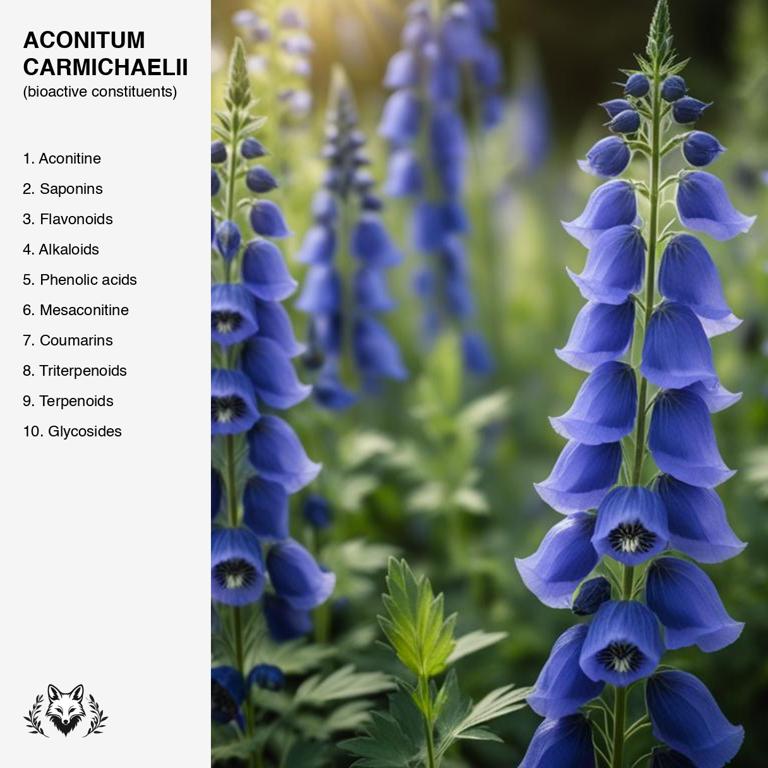
The list below provides more details on what are the major healing constituents of Aconitum carmichaelii and why they are important for health.
- Aconitine: A highly toxic, alkaloid compound with pronounced analgesic and sedative properties, as well as a potential for antitumor and antiviral activity.
- Saponins: Saponins are triterpenoid glycosides that exhibit cytotoxic activity, hemolytic activity, and are known to have antimicrobial and anti-inflammatory properties.
- Flavonoids: Flavonoids are present in Aconitum carmichaelii and have antioxidant, anti-inflammatory, and immunomodulatory properties.
- Alkaloids: Aconitine, mesaconitine, and other Aconitum carmichaelii alkaloids are highly toxic, neurologically active, cardiotoxic, and possess antifungal properties.
- Phenolic acids: Phenolic acids are a class of bioactive compounds found in Aconitum carmichaelii, characterized by their antioxidant, anti-inflammatory, and antimicrobial properties, as well as their ability to modulate the immune system and exhibit neuroprotective effects.
- Mesaconitine: Mesaconitine is an alkaloid constituent of Aconitum carmichaelii, exhibiting cardiotoxic, neurotoxic, and hepatotoxic properties.
- Coumarins: Coumarins are a class of medicinal constituents found in Aconitum carmichaelii, characterized by their anticoagulant, anti-inflammatory, and antioxidant properties.
- Triterpenoids: A type of compound found in Aconitum carmichaelii, characterized by anti-inflammatory, antimicrobial, and antioxidant properties.
- Terpenoids: Aconitum carmichaelii terpenoids are known to possess anti-inflammatory, antimicrobial and antitumor properties.
- Glycosides: A glycoside is a constituent of Aconitum carmichaelii that exhibits anti-inflammatory and sedative properties.
The table that follows estimates the relative concentrations of the main medicinal constituents contained in Aconitum carmichaelii and lists the most relevant medicinal properties of each constituent based on the corresponding concentrations.
| Constituent | Concentration | Properties |
|---|---|---|
| Aconitine | HIGH | Cardiac depressant, Neurotoxin, Cytotoxic, Antimicrobial, Antitumor |
| Saponins | LOW | Antimicrobial, Antioxidant, Anti-inflammatory, Analgesic, Antipyretic, Antiviral, Immunomodulatory |
| Flavonoids | LOW | Antimicrobial, Antioxidant, Anti-inflammatory, Antiviral, Antiproliferative |
| Alkaloids | HIGH | Antimicrobial, Antioxidant, Anti-inflammatory, Analgesic, Cardioactive, Neurotoxic |
| Phenolic acids | MEDIUM | Antimicrobial, Antioxidant, Anti-inflammatory, Analgesic, Antiviral, Anticancer, Antioxidant, Anti-hemorrhagic, Anti-cancer, Vasodilator |
| Mesaconitine | LOW | Analgesic, Antimicrobial, Antioxidant, Anti-inflammatory, Cytotoxic |
| Coumarins | LOW | Antimicrobial, Antioxidant, Anti-inflammatory, Anticancer, Anticoagulant |
| Triterpenoids | LOW | Antimicrobial, Antioxidant, Anti-inflammatory |
| Terpenoids | LOW | Antimicrobial, Antioxidant, Anti-inflammatory, Analgesic, Antibacterial, Anticancer, Antiviral, Immunomodulatory |
| Glycosides | HIGH | Antimicrobial, Antioxidant, Anti-inflammatory, Analgesic, Cardioactive, Cytotoxic |
What are the most used parts of Aconitum carmichaelii in medicine?
The most used parts of Aconitum carmichaelii for medicinal purposes are roots, rhizomes, and flowers.
The roots contain primarily alkaloids, such as aconitine and aconitine derivatives, which exhibit analgesic, anti-inflammatory, and antipyretic properties. The rhizomes contain saponins and phenolic compounds, which possess antioxidant and anti-inflammatory activities. The flowers, on the other hand, contain flavonoids, particularly kaempferol and quercetin, which display antioxidant, anti-inflammatory, and antimicrobial properties.
The medicinal properties of these parts are primarily attributed to their bioactive compounds, which have been traditionally used to treat pain, fever, and inflammation.
The following illustration give a summary of the most used parts of Aconitum carmichaelii in medicine.
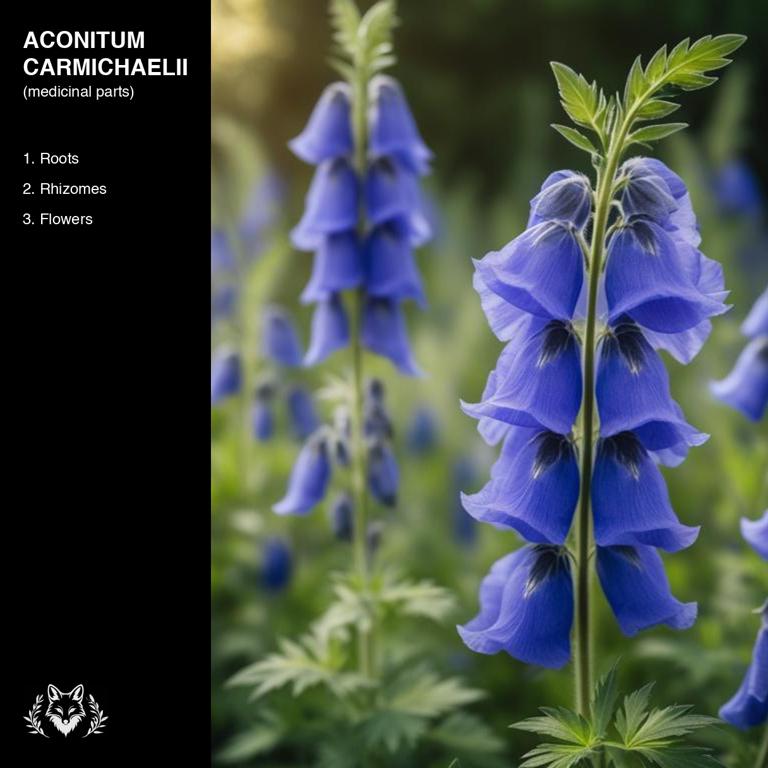
The list below provides more details on what are the most used parts of Aconitum carmichaelii in medicine and why.
- Roots: The roots of this plant contain alkaloids such as aconitine, mesaconitine, and aconitine-8-α-hydroxy-acid, which exhibit analgesic, anti-inflammatory, and antiseptic properties, providing relief from pain, inflammation, and infections.
- Rhizomes: The rhizomes of this plant are rich in aconitine, mesaconitine, and other alkaloids, which possess anti-inflammatory, antiseptic, and immunomodulatory properties, helping to reduce inflammation, fight infections, and regulate the immune system.
- Flowers: The flowers of this plant contain flavonoids, phenolic acids, and saponins, which exhibit antioxidant, anti-inflammatory, and immunomodulatory properties, providing protection against oxidative stress, inflammation, and immune system dysregulation.
The table that follows gives a more complete list of healing constituents found in each part of Aconitum carmichaelii mentioned above.
| Part | Constituents |
|---|---|
| Roots | Aconitine, Aconitidine, Aconitigenin, Choline, Saponins, Triterpenes |
| Rhizomes | Aconitine, Mesaconitine, Hypaconitine, Kanakaonine, Chaconine, Cepharanthine, Magnoflorine, Aconitine-8-al, Aconitine-8-al-8-beta-d-glucoside |
| Flowers | Triterpenoid saponins, Alkaloids, Phenylethanoid glycosides, Sesquiterpene glycosides, Phenolic acids, Flavonoids, Saponin |
What are the most common medicinal preparations of Aconitum carmichaelii?
The most common herbal preparation of Aconitum carmichaelii for medicinal purposes are tinctures, which are liquid extracts used to treat various conditions, including pain and fever.
Aconitum carmichaelii decoction is often employed for its expectorant properties, helping to relieve respiratory issues such as bronchitis and coughs. The salve is a topical preparation used for wound care and skin conditions like eczema and dermatitis, applying the herb's anti-inflammatory properties directly to affected areas. Aconitum carmichaelii ointment is another topical preparation, utilized for its antiseptic and analgesic properties to treat minor injuries and skin irritations.
Suppositories, made from dried and powdered Aconitum carmichaelii root, are used to treat constipation and other gastrointestinal issues.
The following illustration give a summary of the most common medicinal preparations of Aconitum carmichaelii.
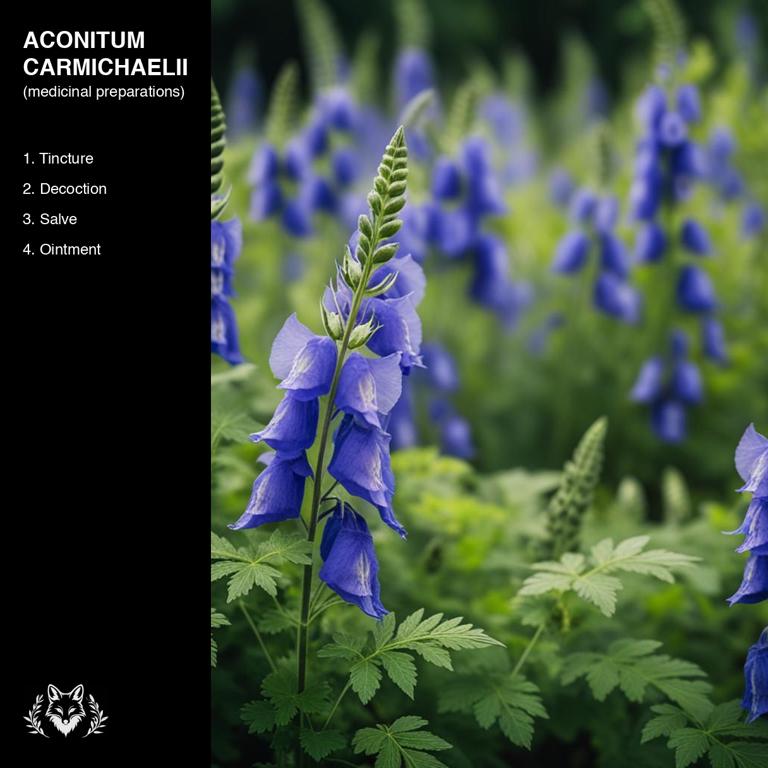
The list below provides more details on what are the most common medicinal preparations of Aconitum carmichaelii and what are their main uses.
- Tincture: Tincture made from this plant is used as a pain reliever and anti-inflammatory for arthritis and other musculoskeletal conditions, and as a cardiovascular stimulant for conditions such as bradycardia and hypotension.
- Decoction: Decoction made from this plant is used to treat rheumatism, fever, and inflammatory conditions, and as an analgesic and antipyretic.
- Salve: Salve made from this plant is used topically to treat pain, inflammation, and itching associated with minor wounds, skin irritations and joint conditions such as arthritis and gout.
- Ointment: Ointment made from this plant is used topically to treat pain, inflammation, and itching associated with rheumatoid arthritis, and also for wound healing and analgesia.
The table that follows shows what are the most used parts of Aconitum carmichaelii for each medicinal preparation.
| Preparation | Parts |
|---|---|
| Tincture | Roots, Rhizomes, Roots |
| Decoction | Roots, Rhizomes, Roots |
| Salve | Roots, Rhizomes |
| Ointment | Roots, Rhizomes |
Tincture
Aconitum carmichaelii tincture is used to treat fever, rheumatism, inflammation, neuralgia, toothache, and headache.
It's a very commonly used herbal remedy, often found in traditional Chinese medicine. Aconitum carmichaelii tincture is known to cause vomiting, diarrhea, and cardiac arrhythmias in many patients. The preparation is made from the roots and rhizomes of Aconitum carmichaelii plants.
The process of making Aconitum carmichaelii tincture is moderately difficult, requiring careful extraction and concentration of the active compounds.
Below you find an image of Aconitum carmichaelii tincture.

Below you find a 5-step quick procedure to make effective medicinal Aconitum carmichaelii tincture.
- Harvest fresh Aconitum carmichaelii roots and rhizomes, clean them thoroughly, and dry them in a cool, dark place.
- Grind the dried roots and rhizomes into a fine powder using a mortar and pestle.
- Combine the powdered roots and rhizomes with 80% vodka in a clean glass container, making sure the plant material is completely submerged.
- Steep the mixture in a cool, dark place for 2-6 weeks, shaking the container every few days to facilitate extraction.
- Strain the mixture through a cheesecloth or a coffee filter into another clean glass container, discarding the solids and storing the resulting herbal tincture in a cool, dark place.
Decoction
Aconitum carmichaelii decoction is a herbal preparation commonly used to treat various health conditions, including gastritis, sore throat, cough, rheumatism, nephritis, malaria and fever.
It's widely used in traditional medicine due to its availability and effectiveness. The common effect of this preparation is analgesic and anti-inflammatory properties. Aconitum carmichaelii decoction is typically made from the roots, rhizomes and roots of the Aconitum carmichaelii plant.
The preparation process is moderately difficult, requiring precise measurements and careful handling to ensure the desired potency and safety.
Below you find a 5-step quick procedure to make effective medicinal Aconitum carmichaelii decoction.
- Harvest fresh Aconitum carmichaelii roots and rhizomes, clean and wash them thoroughly.
- Dry the roots and rhizomes in a well-ventilated area to remove excess moisture.
- Grind the dried roots and rhizomes into fine powder using a mortar and pestle.
- Combine the powdered roots and rhizomes with water in a saucepan to create a decoction.
- Bring the decoction to a boil, then reduce heat and simmer for an extended period to extract the herbs' active compounds.
Salve
Aconitum carmichaelii salve is a traditional herbal preparation used to treat various conditions, including bruises, sprains, insect bites, muscle soreness, skin irritations and wounds.
It's a common remedy due to its widespread use in traditional medicine. The salve typically has a numbing effect, which is attributed to the presence of compounds like aconitine and mesaconitine. Aconitum carmichaelii salve is typically made with the roots and rhizomes of the Aconitum carmichaelii plant, which are rich in alkaloids.
However, the process of preparing the salve is complex and requires expertise, as the roots and rhizomes must be carefully harvested, dried and processed to ensure the desired potency and safety.
Below you find an image of Aconitum carmichaelii salve.

Below you find a 5-step quick procedure to make effective medicinal Aconitum carmichaelii salve.
- Gather and dry the roots and rhizomes of Aconitum carmichaelii in a well-ventilated area.
- Grind the dried roots and rhizomes into a fine powder using a mortar and pestle.
- Combine the powdered roots and rhizomes with a carrier oil, such as olive or coconut oil, in a clean glass jar.
- Heat the mixture in a double boiler or a saucepan set over low heat, stirring occasionally, until the oil has absorbed the herbal properties.
- Strain the mixture through a cheesecloth or a coffee filter into a clean glass container, discarding the solids and allowing the salve to cool before use.
Ointment
Aconitum carmichaelii ointment is used to treat frostbite, arthritis, muscle spasms, bruises, sprains and pain.
This preparation is commonly used in traditional Chinese medicine due to its widespread availability and effectiveness. Aconitum carmichaelii ointment commonly causes numbness and dizziness. The ointment is made from the roots and rhizomes of Aconitum carmichaelii, which are rich in aconitine and other bioactive compounds.
However, the preparation of this ointment is challenging due to the complex process of extracting the active compounds from the roots and rhizomes without causing harm to the user.
Below you find an image of Aconitum carmichaelii ointment.

Below you find a 5-step quick procedure to make effective medicinal Aconitum carmichaelii ointment.
- Gather dried Aconitum carmichaelii roots and rhizomes, ensuring proper identification and sourcing.
- Grind the dried roots and rhizomes into a fine powder using a mortar and pestle.
- Combine the powdered roots and rhizomes with a carrier oil, such as coconut or olive oil, in a clean glass container.
- Heat the mixture over low heat, stirring occasionally, until the powder is fully incorporated and the mixture reaches the desired consistency.
- Strain the herbal ointment through a cheesecloth or fine-mesh sieve into a clean container, discard the solids, and store the ointment in a cool, dark place.
What are the possible side effects of Aconitum carmichaelii if used improperly?
The possible side effects of improperly using Aconitum carmichaelii are vomiting, which can be severe, and nausea.
The plant's toxic compounds can cause individuals to tremble uncontrollably due to the disruption of neural activity. This can progress to collapse, where the person loses muscle tone and becomes unable to support their body weight. If the exposure is not treated promptly, the individual may faint due to a sudden drop in blood pressure.
Prolonged exposure can lead to convulsions, coma, respiratory failure, cardiac arrest, and ultimately death, as the body's vital organs shut down due to the cumulative effect of the toxin.
The most common side effects Aconitum carmichaelii gives people when used improperly are listed below, along with a brief explanation.
- Vomit: Aconitum carmichaelii ingestion can cause severe gastrointestinal irritation leading to vomiting.
- Nauseate: Aconitum carmichaelii ingestion causes severe stomach upset leading to vomiting.
- Tremble: Aconitum carmichaelii toxicity causes tremors
- Collapse: Cardiovascular failure leading to loss of consciousness and death.
- Faint: Aconitum carmichaelii causes a sudden loss of consciousness and muscle tone
- Convulse: Ingestion of Aconitum carmichaelii causes central nervous system toxicity resulting in convulsions.
- Coma: In severe cases, Aconitum carmichaelii poisoning can cause prolonged unconsciousness leading to coma.
- Respiratory Failure: In severe cases, Aconitum carmichaelii toxicity can lead to respiratory failure due to severe pulmonary edema and hypoxia.
- Cardiac Arrest: Aconitum carmichaelii's toxic compounds can cause fatal arrhythmias leading to cardiac arrest
- Death: Consuming Aconitum carmichaelii causes cardiac arrest, respiratory failure, and ultimately death due to its toxic alkaloids.
What are the precautions to take before using Aconitum carmichaelii medicinally?
The precautions to take before using Aconitum carmichaelii medicinally are to use it under medical supervision due to its potential toxicity and complex preparation process.
Start with low doses as the LD50 of Aconitum carmichaelii is extremely low, indicating that even small amounts can be fatal. Monitor vital signs closely as the plant's neurotoxic compounds can cause rapid onset of symptoms. Be aware of its toxicity, which can cause nausea, vomiting, and neurological symptoms, and take steps to minimize exposure.
Proper preparation and storage are also crucial, protecting it from light and storing it safely out of reach, as well as being cautious with potential interactions with other medications.
The most important precautions you must take before using Aconitum carmichaelii for medicinal purposes are listed below, along with a brief explanation.
- Use Under Medical Supervision: Aconitum carmichaelii contains aconitine, a toxic alkaloid that requires medical supervision to avoid overdose and adverse effects.
- Start With Low Doses: Administer Aconitum carmichaelii in small initial quantities to allow dose titration and minimize risk of severe toxicity.
- Monitor Vital Signs: Regularly check pulse, blood pressure, and breathing rate for signs of toxicity and respiratory depression.
- Be Aware Of Toxicity: Aconitum carmichaelii contains aconitine, a highly toxic alkaloid that can cause cardiac arrest, neurological symptoms, and death if ingested, inhaled, or if it enters the body through an open wound.
- Avoid Long-Term Use: Prolonged consumption causes cumulative toxicity leading to severe health consequences.
- Do Not Consume Raw: Consuming raw Aconitum carmichaelii can cause severe gastrointestinal symptoms due to the presence of toxic alkaloids.
- Protect From Light: Aconitum carmichaelii requires low to moderate light intensity to prevent photobleaching of anthraquinone pigments.
- Store Safely Out Of Reach: Aconitum carmichaelii seeds and parts must be kept out of reach of children and pets to prevent accidental ingestion.
- Be Cautious With Interactions: Aconitum carmichaelii interacts with numerous medications and worsens conditions such as diabetes, hypothyroidism, and seizures.
- Follow Proper Preparation: Aconitum carmichaelii preparation requires gloves, eye protection, and a dust mask to prevent skin and eye irritation and inhalation of toxic alkaloids.
